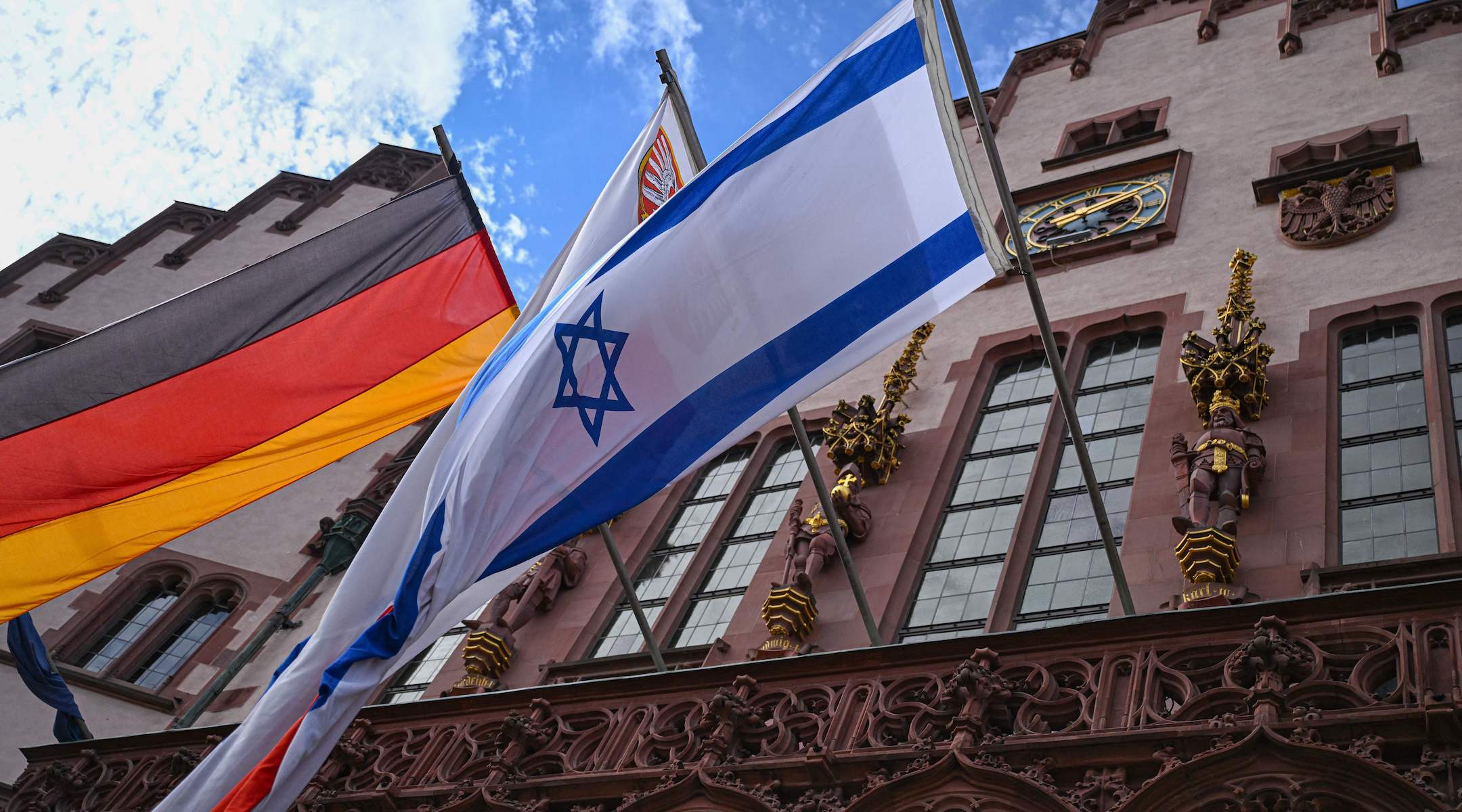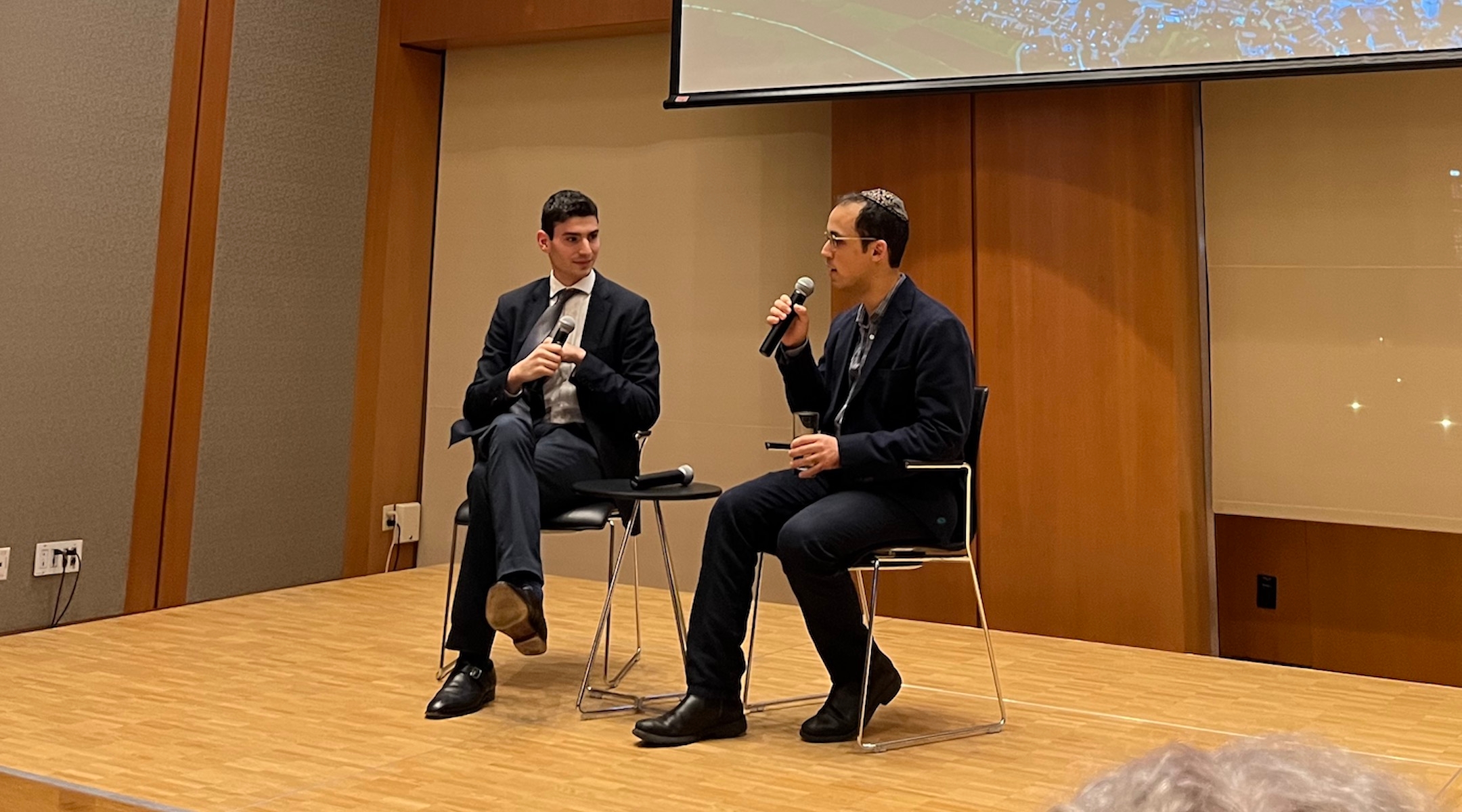(New York Jewish Week) — “Wilkommen,” David Gill, the German Consul General of New York, told a group of Jewish New Yorkers who had gathered at the Consulate last week. A slideshow behind him rotated through scenes of sweeping German landscapes, skylines and tourist attractions.
Nearly all of the 70 people in attendance had recently become German citizens under a law that allows for victims of Nazi persecution and their descendants to reclaim their German citizenship, of which Jews were stripped during the Nazi era. Though the law was enacted in 1949, sweeping changes in the last four years have allowed many more descendants to become eligible for citizenship.
Last Wednesday’s event, called “Discover Germany: Politics, Culture, and Jewish Life,” was the first of its kind to welcome these new Jewish citizens of Germany, and help them learn about German culture and the country’s Jewish life. (Both the United States and Germany recognize dual citizenship.) The aim, said Jordan Rothschild, a consulate representative, was to show these new nationals their future as German citizens, such as scholarship opportunities and a coveted EU passport.
“There is a German diaspora community in New York that has a very specific point of reference for Germany: their parents, grandparents, great grandparents were stripped of their citizenship — often they were survivors of the Holocaust and they have a very specific historical experience with Germany,” Rothschild, a Jewish New Yorker who became a naturalized German citizen 15 years ago at age 7, told the New York Jewish Week.
“There is a huge information gap about modern Germany because of that loss,” he continued. “So it’s very important that [the German Consulate] engages with this community because they’re German and it’s very important that we engage with them as the American Jews as well because that’s what we are.”
Among the event’s attendees, who sipped wine and snacked on German pretzels and mustard, were Harlen Pincus and Judy Pincus. The siblings grew up in New York with a German Jewish mother who fastidiously documented her German ancestry, despite losing her citizenship.
“Going back 200 years, she had all of the synagogue records, birth certificate and deaths and marriages; our grandparents’ original German passports,” Judy Pincus, 59, said. “In that we found letters that our great-grandfather had sent to the regional government talking about his persecution as a Jew and having to flee Germany and the losses he faced economically.”
Letters like that are exactly the type of evidence the German government looks for when extending naturalization. The Pincuses received their citizenship in 2022.
Although Judy Pincus said she has no plans to move there, the siblings traveled to Germany for a two-week trip to visit their grandparents’ hometowns in 2019. She became a citizen, she said, in part so that her two sons could easily travel and study there.
“I think she’d be happy,” Pincus said of her mother. “If she had the opportunity [to recover her citizenship], she would have done it.”
German Jewry has seen a major resurgence in its numbers since the fall of the Berlin Wall in 1989; in the decades since, many Soviet Jews relocated there as well as survivors and descendants who came back. Today there are about 118,000 Jews in the country, according to the World Jewish Congress, including some 20,000 Israelis.

The national flags of Israel and Germany wave at the city hall in Frankfurt, Germany, Oct. 14, 2023. (Kirill Kudryavtsev/AFP via Getty Images)
Germany is also a major ally of Israel — Chancellor Olaf Scholz was one of the first foreign ministers to visit the country after the Hamas attacks on Oct. 7. As Gill told the room in New York: “In this moment, we feel very close to our Jewish partners and friends, in a time of unseen threats against Israel and the Jewish people.”
Gill did not, however, mention the Molotov cocktails that were thrown at a Berlin synagogue earlier that morning. The firebombs landed on the sidewalk and caused no damage.
The event included a crash course on the German political system, an introduction to German cultural offerings in New York, as well as a presentation about scholarship opportunities for studying in German universities. Guests were a range of ages, from teenagers with parents to seniors.
“The night that Donald Trump was elected president, I was living in a Republican area and I came home that night and people were celebrating by shooting guns in the air to celebrate. I was terrified and wanted an option of somewhere else to go,” said Sarah Myerson, the cantor at Kane Street Synagogue, who became a German citizen last year. “I always had a positive relationship with Germany. I lived there and met my husband there. My grandmother always had a positive relationship with Germany, as well. Germany was her country.”
The New York Consulate naturalized roughly 900 citizens who are descendents of Holocaust survivors in the last two years. said Anna Miebach, a deputy consul who handles the naturalization applications. “German citizenship is often seen as an added sense of security, so if the political situation maybe is a bit troubling, we see an uptick in applications,” she told he New York Jewish Week. She said that in 2022, there were just over 8,000 naturalizations to German citizenship from around the world; roughly a quarter of them were American.
Miebach added that while the consulate doesn’t track the number of newly naturalized citizens who permanently move to Germany, she thinks it is rare. However, “visiting and studying is very common,” she said, and traveling to Europe with ease is a big part of the motivation of many who apply.
Miebach added that since 2020, there have been several changes in the naturalization law, called the Article 116 Par. 2 Basic Law. The changes allowed even more Jewish descendants to apply for and receive citizenship, including descendants who could trace their lineage through the matrilineal line as opposed to just the patrilineal line.
“We are here to support you in this journey, which can be very emotional,” Miebach said. “I think often when people want to start this process it feels a bit isolating. Every family member may not be on board with them getting citizenship. These outreach events are very important to make the whole process more personalized.”
The event concluded with a discussion between Rothschild and Sami Vingron, a German Jew who grew up in Berlin and is now in his final year of rabbinical school at the Jewish Theological Seminary uptown.
Vingron said that Jews in Germany find themselves in a unique position of being forced to acknowledge the atrocities of the Holocaust on a daily basis — as he put it, “I learned to windsurf at the Wannsee,” site of a meeting in which Nazi officials planned the genocide.
But this aspect of German Jewish identity makes the Jewish community feel a certain closeness and responsibility towards each other, he added. “There’s a very strong sense of collective identity, of being there for each other in Germany,” said Vingron, who plans to return to Germany. “Jews in our times want to preserve what was there but also want to go into the future and have a diverse Judaism.”
For Rose Freymuth-Frazier, a New York City based-artist who created a Facebook group for newly naturalized citizens, meeting other people who went through the same process as her has been a major bonus to the experience.
“When I walked into this room I got a bit choked up. Every time I walk into the Jewish space, I think, of course, we’re all related,” she said. “But the feeling is even more pronounced among German Jews. There’s a closeness here. We’ve all been through the same experience. It’s an amazing feeling.”
The New York Jewish Week brings you the stories behind the headlines, keeping you connected to Jewish life in New York. Help sustain the reporting you trust by donating today.





